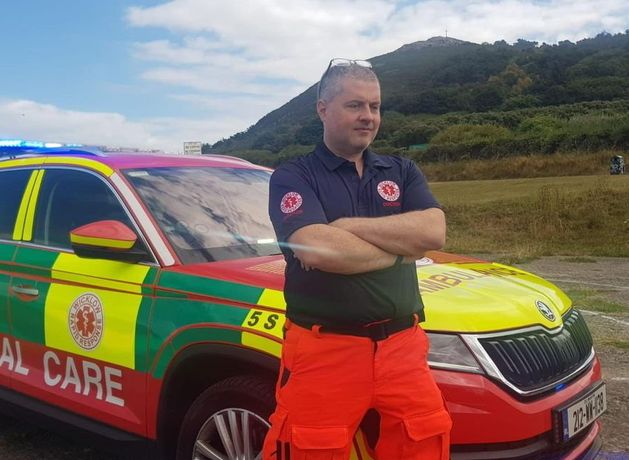Wicklow Rapid Response says rise in road accidents ‘not just a blip’ after ‘one of its busiest periods ever’

Commenting on the statistics for the first quarter of 2024, the charity’s doctor, Dr David Menzies, an Emergency Medicine Consultant at St Vincent’s University Hospital, said that “there’s definitely been an increase” in emergency call-outs.
Dr Menzies is tasked by the National Ambulance Service (NAS) for serious emergencies, when he is the closest available resource, or where the specialist critical care skills he can provide are required.
In January, February, and March, he attended to 55 incidents, including 15 cardiac/respiratory arrests and two STEMIs (a type of heart attack that mainly affects the heart’s lower chambers), eight road traffic collisions, four paediatric calls, one water incident, two blood and plasma transfusions, three stabbings and two multiple casualty incidents.
“Demand for healthcare in general is going up,” Dr Menzies explained. “So, the number of people attending emergency departments, the number of people calling ambulances, the number of people in the country has all increased since last year.
“It would be surprising if demand had gone the other way. So I suppose that’s the first thing, that everything is busier compared to this time last year.
“That’s more people in the country, more elderly people, more pathology, more need for healthcare.
“The second thing is, it is a small service. It’s basically, currently, mostly me. So the number is also related to my availability to respond, obviously with work, time off, holidays and so forth. So, you could look at a different quarter and the demand could be exactly the same, but I might be more available or less available.
But,” he conceded, “demand is going up.”
Remarking specifically on road traffic collisions, Dr Menzies said the statistics were “stark”.
A total of 55 people have died on Irish roads so far this year, with 16 deaths in March, including that of truck driver John Hudson (48), who was killed in a single-vehicle on the M11 at Arklow, on Tuesday, March 19.
“Everybody’s aware it’s been a really bad [period of] weeks and months for road traffic deaths in Ireland and also serious injuries, which are often not as reported as much because it’s not as apparent at the time of the crash,” he said.
“But a death is a death and a road traffic collision is a really stark statistic and it’s one that’s easily tracked. That’s gone up significantly in the last couple of weeks and months.
“We’d all love to hope that that’s a blip on the back of a couple of years where we’ve had really good improvements in road safety. But it’s starting to look like it’s not a blip. And I mean, this isn’t so much on foot of my work, but I think in general, driver behaviour is a huge factor.
“I think drink driving is a lot less than it used to be. Drink and drug driving is something that can’t be tolerated. But I don’t think we’re in a place that we were 10 years ago with that. I think that has become socially unacceptable.
“The other things, though, whether it’s speeding or mobile phone use, I think probably are factors that can be harder to prove. You can do a blood test for blood alcohol level.”
There was gridlock on the M11/N11 between exits J06 and J05 Bray (northbound) at around 3pm on bank holiday Monday, April 1, following a crasg and a few hours later, at 7pm, lanes were affected further south at Coynes Cross when animals strayed onto the road and caused havoc for drivers. While not commenting specifically on those events, Dr Menzies pointed out driver behaviour that makes his job, and that of other emergency services, a lot more difficult, which can be critical.
“When we have a road traffic collision, particularly on a national road or motorway, the hard shoulder is essential for the emergency services to get to that collision,” he said.
“The behaviour of motorists is often to use the hard shoulder to short circuit their delay. And that actually ends up compounding it because then we have to clear the hard shoulder to get all the emergency services to the crash, to clear the crash, to reopen the road.
“So if the traffic in front of you is stopped, the last place you should go is the hard shoulder. It’s for the emergency services and for breakdowns and other emergencies.
“It can be used to allow somebody to overtake you if you’re moving slowly. But other than that, you shouldn’t be in the hard shoulder. I would really make a plea to people to perhaps follow that advice. No one wants to be delayed. But the quickest way we can reopen the road is to get out from there quickly and do our job and move on.”
While the statistics for “one of our busiest periods ever” at Wicklow Rapid Response were daunting, the charity pointed out that it also undertook training sessions with local Community First Responder teams, Dublin Wicklow Mountain Rescue Team, the National Ambulance Service, Wicklow Fire Service and Greystones Wicklow Coastguard.